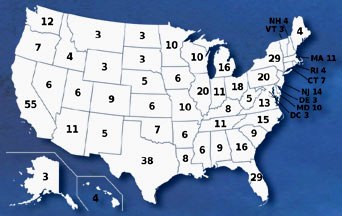
A move is afoot to circumvent the Electoral College, especially in light of the 2016 election. States are now introducing legislation that seeks to undermine the institution. Fortunately, Democratic Governor Steve Sisolak of Nevada dared to veto one such bill after it passed in both state houses.
Other states have not resisted the temptation for change. Delaware, Colorado and New Mexico joined eleven other states and the District of Columbia this year in a special compact. The agreement automatically gives their electoral votes to the winner of the national popular vote regardless of how people in their state voted.
As it now stands, the compact will only take effect once the total number committed by the renegade states reaches 270 votes—a majority. The present tally is 189 votes with many more states discussing the issue on the horizon. The goal is to make the Electoral College irrelevant.
Nevada Governor Sisolak faced a paradoxical situation. Circumventing the Electoral College is supported by his own Democratic Party, which is still pouting after losing the 2016 presidential election, despite winning the popular vote. However, Nevada is a small state that benefits from the Electoral College system. Candidates visit the state because of its clout. Also, in a betrayal of the state’s own voters, the measure could easily give the state’s electoral votes to the candidate who did not win the popular vote inside the state.
Eternal and Natural Law: The Foundation of Morals and Law
Under the present electoral vote system, each state gets votes equal to the number of its U.S. representatives and two senators. Thus, the small states gain importance in the final tally and therefore merit candidates’ attention.
Advocates of the Electoral College point out that the system protects the interests of small states that might otherwise be ignored by candidates who would concentrate on centers of high population. Thus, the system provides a broad national mandate for governing by considering all areas of the country.
Opponents point to the elections that have given victory to those who win the electoral vote but lose the popular vote. It might also discourage voters in which one party has a clear advantage. According to the rules, “rogue” electors might vote for another candidate, although this has rarely happened.
10 Razones Por las Cuales el “Matrimonio” Homosexual es Dañino y tiene que Ser Desaprobado
Abolishing the Electoral College has long been debated. It remains as one of those “organic” methods that have developed over time. It is unique and not one-size-fits-all. It remains part of the nation’s rich history. The College has served the country well as a means of broadening participation in the selection of the president. Like all things human, it has its shortcomings. Alexander Hamilton supported the method, arguing that while it might not be perfect, it was “at least excellent.” Thus, if it is to be changed, it should be done with great care and following the rules.
This is why the Democratic Party’s strategy for sidestepping the Electoral College is so disconcerting. It does not follow procedures to change the rules. Instead, it seeks to circumvent them by emptying the institution of any meaning.
The Electoral College was set up by the United States Constitution. Thus, the only way to change or abolish the College is through the laborious process of a constitutional amendment. This would require a two-thirds vote of both chambers of Congress and ratification by three-fourths of the states—including the small states that stand to lose with the National Popular Vote Interstate Compact Bill.
 Learn All About the Prophecies of Our Lady of Good Success About Our Times
Learn All About the Prophecies of Our Lady of Good Success About Our Times
Many believe that measures like the failed Nevada bill are probably unconstitutional since they frustrate the purpose of the College and could force electors to vote contrary to the will of the citizens of the state. However, Democrats are ramming these bills through anyway. They hope they might enter under the radar by lining up a 270-majority of electoral votes with the popular vote option. By presenting their victories as evidence of the popular will, they hope to legislate by fiat without having to trouble with amending the Constitution.
In this way, state law will circumvent the highest law of the land. It is one more step toward the decline of the American political and legal orders. Ironically, the left usually supports centralized federal power…except in cases like these when it does not favor its own causes.
